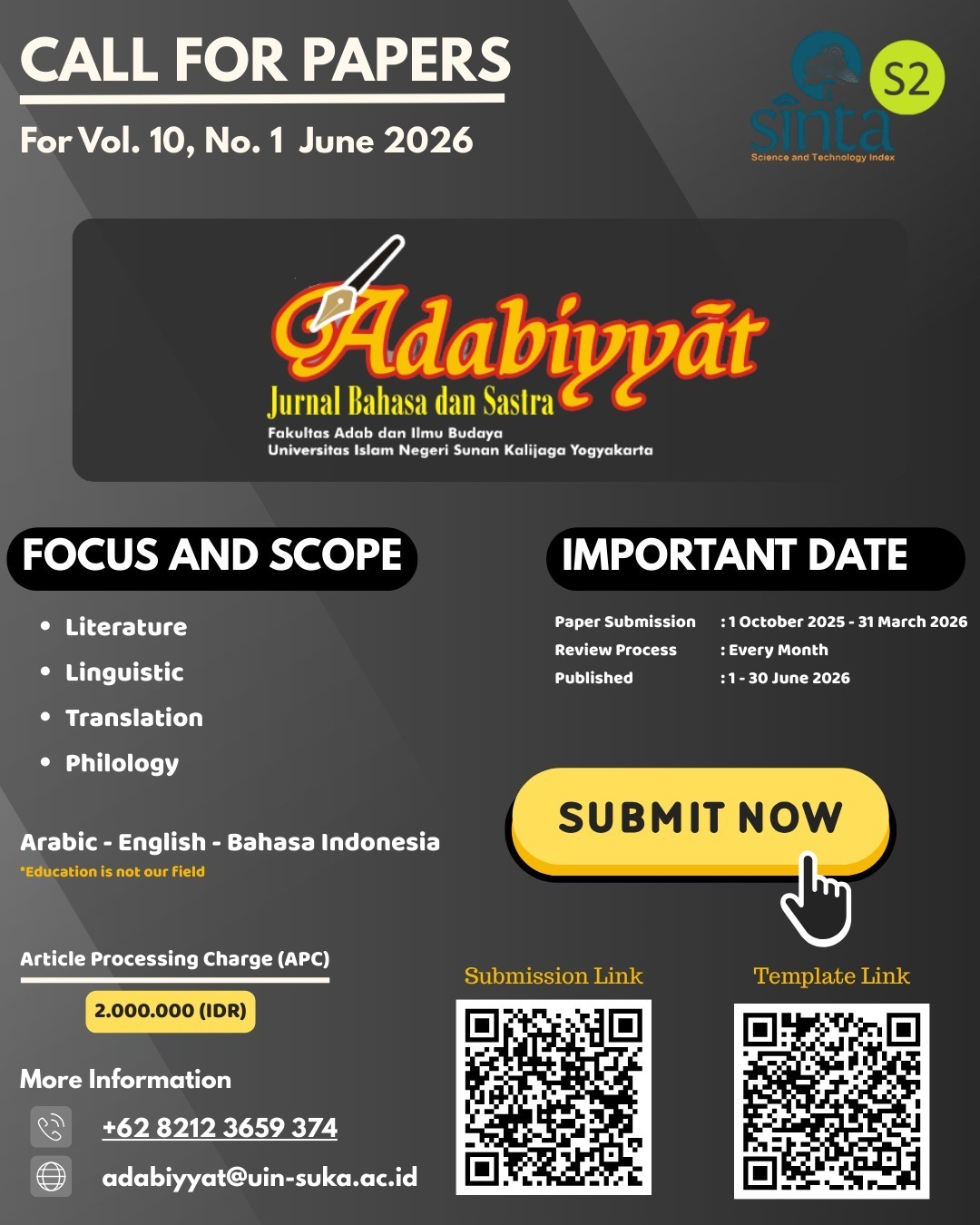MENILIK MODAL SIMBOLIK HALIMI ZUHDY SEBAGAI SASTRAWAN ARAB DARI INDONESIA
DOI:
https://doi.org/10.14421/ajbs.2021.05106الكلمات المفتاحية:
symbolic capital، cultural capital، Halimi Zuhdy، Arabic poet from Indonesiaالملخص
This research aims to disclose the symbolic capital of Halimi Zuhdy as an Arabic Poet of Indonesian. Halimi's legitimacy cannot be separated from the symbolic, social and cultural capital he possesses. This research scrutinizes the strategy and legitimacy of Halimi as an Arab Poet from Indonesia. To describe this problem, the researcher uses the literary sociology approach of Pierre Bourdieu, especially concerning the arena of literary production and legitimacy in gaining symbolic capital. Halimi has practical social capital as he was educated at an Islamic boarding school. At the same time, institutionally, Halimi is a caregiver for the Darunnun Islamic boarding school. In Halimi's cultural capital, he has written several Arabic literary works and he has achieved a position as Chair of the Arabic Language and Literature study program and a new position of Deputy Dean the Faculty of Humanities UIN Malang. Meanwhile, in terms of symbolic capital, Halimi was nominated for the Nobel Prize in Literature from Munir Mazid for his achievements. The accumulation of capital built up in the literary arena has made Halimi achieve the position of an Indonesian Arab Poet. The dialectic of knowledge built by Halimi has also accumulated his fame.
التنزيلات
المراجع
Badrus Saleh. 2017. Santrawan Santri: Etnografi Sastra Pesantren. Semarang: Elsa Press.
Bourdieu, Pierre. 1991. Language and Symbolic Power. Massachusetts: Harvard University Press.
———. 1993. The Field of Cultural Production: Essays on Art and Literature. Columbia University Press.
Halimi Zuhdy. 2011. “Halimi Zuhdy, di akses pada tanggal 15 Agustus 2021, https://www.jendelasastra.com/user/halimi-zuhdy.”
Haryatmoko. 2016. Membongkar rezim kepastian: pemikiran kritis post-strukturalis. Yogyakarta: Kanisius.
Hasan, M. Nur. 2016. “Profil Halimi Zuhdy : Menulis Itu Mencerdaskan dan Menyehatkan.” 2016. http://www.darunnun.com/2016/12/profil-halimi-zuhdy-menulis-itu.html.
Istiqomah, Aah, Makomam Mahmuda, dan Rosyidatul Masruroh. 2018. “Analisis Kearifan Budaya Lokal dalam Syiir Karya Halimi Zuhdy.” Kajian tentang Bahasa, Sastra dan Budaya Arab Vol.II.
Jenkins, Richard. 1992. Pierre Bourdieu. London: Routledge.
Krisdinanto, Nanang. 2014. “Pierre Bourdieu, Sang Juru Damai.” Kanal Vol. 2, No. 2,.
Martono, Nanang. 2012. Kekerasan Simbolik di Sekolah Sebuah Ide Sosiologi Pendidikan Pierre Bourdieu. Jakarta: Rajawali Pers.
Mazīd, Munīr. 2012. “I’lān Asmā’ Fāizīn bi Jāizati Munīr Mazīd fī al-Syi’r wa al-Tarjamah,” 2012. http://www.alnoor.se/article.asp?id=139720.
Nugraha, Latief S. 2015. “Strategi, Agen, dan Posisi Emha Ainun Nadjib di Arena Sastra dan Arena Sosial,” no. 2: 13.
Pierre Bourdieu. 1991. Language and Symbolic Power. Massachusetts: Harvard University Press.
PP Darunnun. 2015. “Halimi Zuhdy: Penyair Indonesia, Menulis Puisi Arab. http://www.darunnun.com/2015/02/menilik-sebuah-agen-rahasia-islam-no_25.html#more.”
Safitri, Anggun Nirmala. 2015. “Pergulatan Iman Budhi Santosa Untuk Mencapai Posisi Terkonsekrasi Dalam Arena Sastra Yogyakarta,” no. 2: 8.
Salam, Aprinus, dan Saeful Anwar. 2015. “Strategi dan Legitimasi Komunitas Sastra di Yogyakarta: Kajian Sosiologi Sastra Pierre Bourdieu.” Widyaparwa Volume 43, Nomor 1.
Saleh, Badrus. 2017. Santrawan Santri: Etnografi Sastra Pesantren. Semarang: Elsa Press.
Sudarto. 1996. Metodologi Penelitian Filsafat. Jakarta: PT Raja Grafindo Persada.
Weber, Max. 2012. Sosiologi Agama. Diterjemahkan oleh Yudi Santoso. Yogyakarta: IRCisod.
Zuhdy, Halimi. 2011. “Halimi Zuhdy.” 2011. https://www.jendelasastra.com/user/halimi-zuhdy.
Zuhry, Ach. Dhofir. 2019. Peradaban Sarung: Veni, Vidi, Santri. Jakarta: Kompas-Gramedia.
التنزيلات
منشور
إصدار
القسم
الرخصة
الحقوق الفكرية (c) 2021 Mukhamad Syaiful Milal

هذا العمل مرخص بموجب Creative Commons Attribution-ShareAlike 4.0 International License.
- Adabiyyāt: Jurnal Bahasa dan Sastra publishes all articles entirely in full text.
- It is permissible for readers to download and to use it for scientific purposes and scientific dissemination.
- The author can re-publish the article that has been published by the Adabiyyāt: Jurnal Bahasa dan Sastra after obtaining written permission from the editor. This letter can be obtained by submitting a request letter for permission to republish the article to Adabiyyāt: Jurnal Bahasa dan Sastra via email adabiyyat@uin-suka.ac.id. In the second publication, the author is required to include information that the article was firstly published by the Adabiyyāt: Jurnal Bahasa dan Sastra.




















